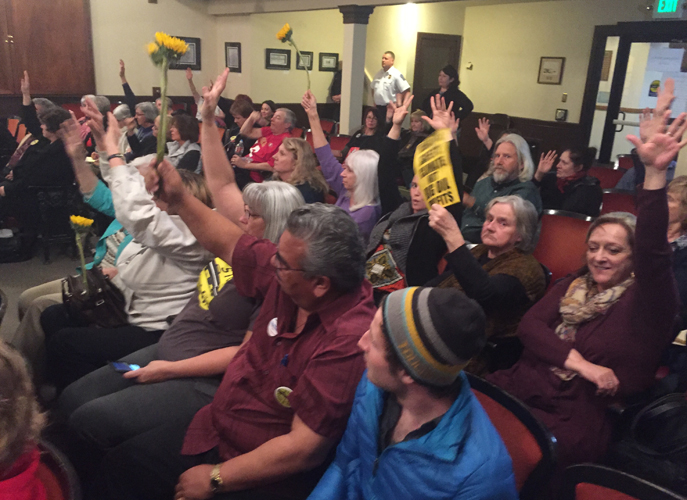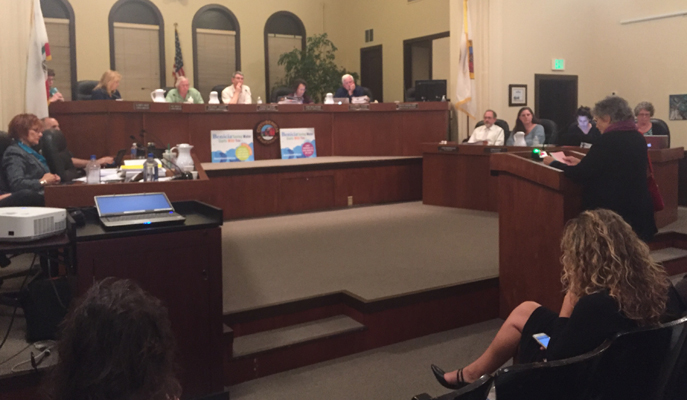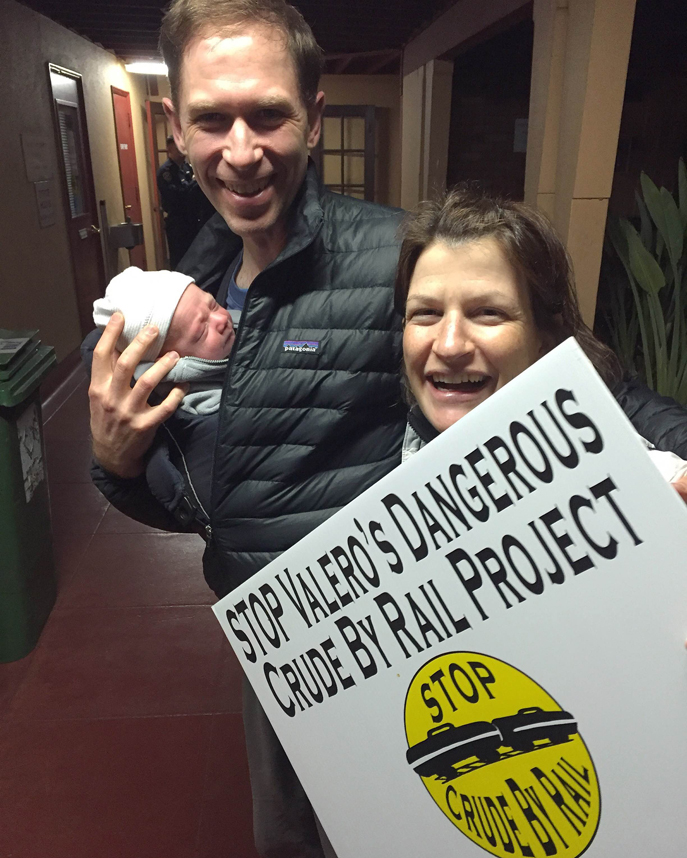Benicia is a small waterside city near San Francisco that is perhaps best known for briefly serving as the California state capital in the 1800s. But last week, six planning commissioners in this quiet community dealt a blow to the oil industry when they unanimously rejected oil giant Valero’s proposal to transport crude to its local refinery in dangerous oil trains. Valero’s plan to receive two 50-tanker oil trains each day at the Benicia refinery is emblematic of broader industry efforts to ramp up transport of oil -- including dirty tar sands crude from Canada and explosive Bakken crude from North Dakota -- in mile-long trains to refineries along the West Coast.
The 6-0 vote came shortly before midnight on Thursday, February 11th -- after four consecutive nights of public hearings that lasted until 11 pm or later. When the hearings began at Benicia City Hall on Monday evening, more than 150 people had signed up to speak and the crowd filled the hearing room, several overflow rooms, and the building's courtyard. The commissioners heard from scores of concerned Benicia residents -- and also from residents of “up-rail” towns and cities (including Sacramento and Davis) who would be endangered by the oil trains rolling through their communities on the way to the Valero refinery. Oil train derailments and explosions have increased dramatically in recent years -- including the July 2013 oil train derailment in Lac-Megantic, Canada that tragically killed 47 people.

Benicia City Hall was still packed at 11:30pm on night 3 of of the Planning Commission hearings.
In denying the project, the commissioners went against City planning staff's recommendation to approve Valero's proposal. Staff recommended approval despite concluding that the benefits do not outweigh the numerous “significant and unavoidable” impacts on up-rail communities (including derailments, oil spills, and explosions). The staff report insisted that federal regulation of railroads means that the legal doctrine of preemption prohibits the City from mitigating -- or even considering -- any of the serious risks that oil trains pose to communities and sensitive environments along the rail line.
During the public hearing, the contract attorney hired by the City repeatedly told the commissioners that they unquestionably lack any authority to deny the permit based on these rail impacts -- and went so far as to say that mere disclosure of these impacts could be unlawful.
Attorneys from the Sierra Club, Natural Resources Defense Council, and the Stanford Law School clinic testified at the hearing, refuting this expansive interpretation of the preemption doctrine and urging the commissioners to reject it. Before voting to deny the project, several commissioners expressed skepticism that they are legally required to turn a blind eye to the grave dangers that oil trains pose to up-rail communities. One commissioner told the contract attorney that his interpretation of the preemption issue is "180 degrees different" from the view expressed by other attorneys. (Using more colorful language, another commissioner noted: "I don't want to be the planning commissioner in the one city that said 'screw you' to up-rail cities.")

Linda Maio, Vice Mayor of the City of Berkeley, California, speaking to the Benicia Planning Commission.
For years, the Sierra Club and our partners have pushed back against Valero's attempts to conceal the true impacts of its oil train proposal. The City initially tried to approve the project without conducting full environmental review. In 2013, we submitted comments challenging that course of action, which contributed to the City's decision to circulate an "environmental impact report" (EIR) for the project. We then submitted comment letters identifying major flaws in the the draft EIR (2014), revised draft EIR (2015), and final EIR (2016). Our allies in these efforts include Benicians for a Safe and Healthy Community, NRDC, ForestEthics, Communities for a Better Environment, Center for Biological Diversity, Sunflower Alliance, and SF Baykeeper, among others.
The Attorney General also weighed in on the inadequacies of the City's environmental review -- specifically noting the failure to adequately analyze impacts on up-rail communities. And the Sacramento Area Council of Governments, which represents 6 counties and 22 cities, characterized the City's environmental review as "a non-response" to its public safety concerns about oil trains traversing the Sacramento area.
After voting to deny the project, the Planning Commission issued a resolution identifying 14 deficiencies in the final environmental impact report. The resolution also concluded that “Staff’s interpretation of preemption is too broad….” (Notably, just a few days before the Benicia hearings, hundreds of people converged on San Luis Obispo to urge county planning commissioners to reject a similar oil train proposal at a Phillips 66 refinery. In direct contrast to the position adopted by the Benicia planning staff, the San Luis Obispo county planning staff recommended denial of the project -- due in large part to the environmental and health impacts along the rail line. The San Luis Obispo planning commissioners are expected to vote on the Phillips 66 proposal in March.)
Valero has until February 29th to appeal the Planning Commission's decision to the Benicia City Council.

Benicia residents came to City Hall to voice their opposition to Valero’s oil train project.
Media
Oil train safety gets an important boost (Sacramento Bee, 2/16/16)
California planners reject Valero oil-by-rail project (Reuters, 2/12/16)
Benicia commissioners deny Valero’s crude by rail application (Contra Costa Times, 2/12/16)
Benicia commission derails Valero’s plan to deliver crude oil by train (CBS San Francisco, 2/12/16)
Oil train plans hit roadblocks in California (Sacramento Bee, 2/12/16)
Benicia commission rejects crude oil trains (Sacramento Bee, 2/11/16)
Passionate testimonies pour in on Valero proposed project (Vallejo Times-Herald, 2/11/16)
Benicia Planning Commission begins hearing to decide on crude-by-rail project (Vallejo Times-Herald, 2/9/16)
Residents voice concerns over proposed rail transport in Benicia (KCRA Sacramento, 2/8/16)
Sacramento officials challenge Benicia oil train project (Sacramento Bee, 2/5/16)